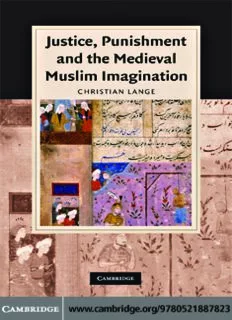
Justice, Punishment and the Medieval Muslim Imagination PDF
Preview Justice, Punishment and the Medieval Muslim Imagination
This page intentionally left blank Justice, Punishment, and the Medieval Muslim Imagination How was the use of violence against Muslims explained and justified in medieval Islam?Whatroledidstatepunishmentplayindelineatingtheprivatefromthepublic sphere?Whatstrategiesweredeployedtocopewiththesufferingcausedbypunish- ment?ThesequestionsareexploredinChristianLange’sin-depthstudyofthephe- nomenonofpunishment,bothdivineandhuman,ineleventh-tothirteenth-century Islamic society. The book examines the relationship between state and society in meting outjustice, Muslim attitudes to hell andthe punishments that were in store in the afterlife, and the legal dimensions of punishment – how different types of retribution were justified, circumscribed, or rejected altogether by Muslim jurists. The crossdisciplinary approach embraced in this study, which is based on a wide variety of Persian and Arabic sources, sheds light on the interplay between theory andpracticeinIslamiccriminallaw,andbetweenexecutivepowerandthereligious imaginationofmedievalMuslimsocietyatlarge. CHRISTIAN LANGE is Lecturer in Islamic Studies in the School of Divinity at the UniversityofEdinburgh. CambridgeStudiesinIslamicCivilization EditorialBoard DavidMorgan(generaleditor) VirginiaAksan,MichaelBrett,MichaelCook,PeterJackson, TarifKhalidi,ChaseRobinson Publishedtitlesintheseriesarelistedatthebackofthebook Justice, Punishment, and the Medieval Muslim Imagination CHRISTIAN LANGE UniversityofEdinburgh CAMBRIDGEUNIVERSITYPRESS Cambridge, New York, Melbourne, Madrid, Cape Town, Singapore, São Paulo Cambridge University Press The Edinburgh Building, Cambridge CB28RU, UK Published in the United States of America by Cambridge University Press, New York www.cambridge.org Information on this title: www.cambridge.org/9780521887823 © Christian Lange 2008 This publication is in copyright. Subject to statutory exception and to the provision of relevant collective licensing agreements, no reproduction of any part may take place without the written permission of Cambridge University Press. First published in print format 2008 ISBN-13 978-0-511-41414-5 eBook (EBL) ISBN-13 978-0-521-88782-3 hardback Cambridge University Press has no responsibility for the persistence or accuracy of urls for external or third-party internet websites referred to in this publication, and does not guarantee that any content on such websites is, or will remain, accurate or appropriate. Contents Acknowledgments pagevi Listofabbreviations viii Introduction 1 PART I THE POLITICS OF PUNISHMENT 23 1 Spheresandinstitutionsofpunishment 25 2 Typesofpunishment 61 PART II THE ESCHATOLOGY OF PUNISHMENT 99 3 Thestructureofhell 101 4 Hell’screaturesandtheirpunishments 139 PART III LEGAL DIMENSIONS OF PUNISHMENT 177 5 Circumscribingh.addinSunn(cid:2)ılaw 179 6 Discretionarypunishment(taqz(cid:2)ır)andthepublicsphere 215 Conclusion 244 Bibliography 249 Indexofnames 280 Indexofsubjects 285 v Acknowledgments MyfirstwordsofgratitudegotothequadrumvirateofPh.D.advisorswho haveseenthisstudythroughitsvariousphases,allofthemDoktorva¨terinthe truesense(s)oftheword.WilliamA.GrahamfromHarvardDivinitySchool hasaccompaniedmygraduatecareerfrombeginningtoendandhasalways beenasourceofencouragementandinspiration.BaberJohansengraciously welcomedmeatL’E´ coledesHautesE´ tudesenSciencesSocialesinParisand then continued to guide my work at Harvard University with unfaltering patienceandkindness.RoyMottahedehsparkedmyinterestinanumberof key issues relating to Salju(cid:2)q social history. Wheeler Thackston has offered academic advice, musical distraction, and caring friendship throughout the years,forallofwhichIamdeeplygrateful. AnArabicproverbinMayd(cid:2)an(cid:2)ı’s(d.518/1124)famouscollectionhasitthat ‘‘travelingisapunishmentfromhell’’–inmycase,it’sbeenablessing.Iam greatlyindebtedtoWolfhartHeinrichsandtheNearEasternLanguagesand Civilizations Department at Harvard University for a two-year traveling grant which has afforded me the privilege to write the initial version of this studyinanumberofinspiringlocations:attheGermanOrientalInstitutein Beirut,theDekhodaInstituteinTehran,andtheInstituteofShar(cid:2)ıqaSciences inMuscat.IamalsothankfultoHeinzGaubeandqAbdal-Rah.m(cid:2)anal-S(cid:2)alim(cid:2)ı forfacilitatingmystayinMuscat. Different parts of this study were presented at a number of seminars and conferences: at the German Oriental Institute Beirut (April 9, 2005), the Berlin Free University (May 19, 2005), the American Academy of Religion (Philadelphia, November 20, 2005), the University of Colorado at Boulder(December1,2005),theAmericanOrientalSociety(Seattle,March 18,2006),theConsejoSuperiordeInvestigacionesCientı´ficas(Madrid,June 16,2006),HarvardLawSchool’sIslamicLegalStudiesProgram(Cambridge, September 8, 2006), and the Middle East Studies Association (Boston, November27,2006). Iwishtothank theorganizersofthe panels aswellas all those present during the discussions for their valuable comments. I also would like to thank Kevin Reinhart and Cambridge’s two anonymous reviewers for reading the manuscript and greatly enhancing the factual vi Acknowledgments vii accuracyandlogicalcoherenceofthisstudy.Asalways,allremainingerrors andomissionsareexclusivelymyownshortcomings. Perhaps the greatest reward in studying punishment has been the oppor- tunity to share thoughts and concerns with a number of friends and fellow graduate students at Harvard and beyond. Sarah Savant, Travis Zadeh, Ahmed El-Shamsy, and Jasmin Adam have read different parts of this study and given valuable feedback. Blain Auer, Yaron Klein, Kobi Gal, YoavLiebermann,andIlanWapinskihaveofferedawealthofgoodadvice andconstructivecriticism.Theirfriendshiphasbeenthefoundationonwhich this study has been built. The book is dedicated to my parents – fu¨r Euer VertrauenundEureGeduld. Abbreviations BSOAS BulletinoftheSchoolofOrientalandAfricanStudies CHI5 TheCambridgeHistoryofIran,Vol.V,TheSaljuqandMongol Periods.EditedbyJ.A.Boyle.Cambridge:Cambridge UniversityPress,[1968] EI1 TheEncyclopaediaofIslam.5vols.EditedbyT.Houtsmaetal. Leiden:Brill,1913–34 EI2 TheEncyclopaediaofIslam:NewEdition.12vols.Editedby H.A.R.Gibbetal.Leiden:Brill,1954–2004 EQ TheEncyclopaediaoftheQurpa(cid:2)n.5vols.EditedbyJaneDammen McAuliffeetal.Leiden:Brill,2001–6 GAL CarlBrockelmann.GeschichtederarabischenLiteratur.First published1898.Leiden:Brill,1943–9 IJMES InternationalJournalofMiddleEastStudies ILS IslamicLawandSociety IOS IsraelOrientalStudies JAOS JournaloftheAmericanOrientalSociety JRAS JournaloftheRoyalAsiaticSociety LN qAl(cid:2)ıAkbarDihkhud(cid:2)a.Lughatna(cid:2)ma.Firstpublished1946–. 6vols.Tehran:Mupassasa-yiDikhud(cid:2)a,1363–/[1985–] MA qAbbu(cid:2)dal-Sh(cid:2)alj(cid:2)ı.Mawsu(cid:2)qatal-qadha(cid:2)b.7vols.Beirut:al-D(cid:2)ar al-qArabiyyali-l-Mawsu(cid:2)q(cid:2)at,1980 SI StudiaIslamica ZDMG Zeitschriftderdeutschenmorgenla¨ndischenGesellschaft viii
Description: